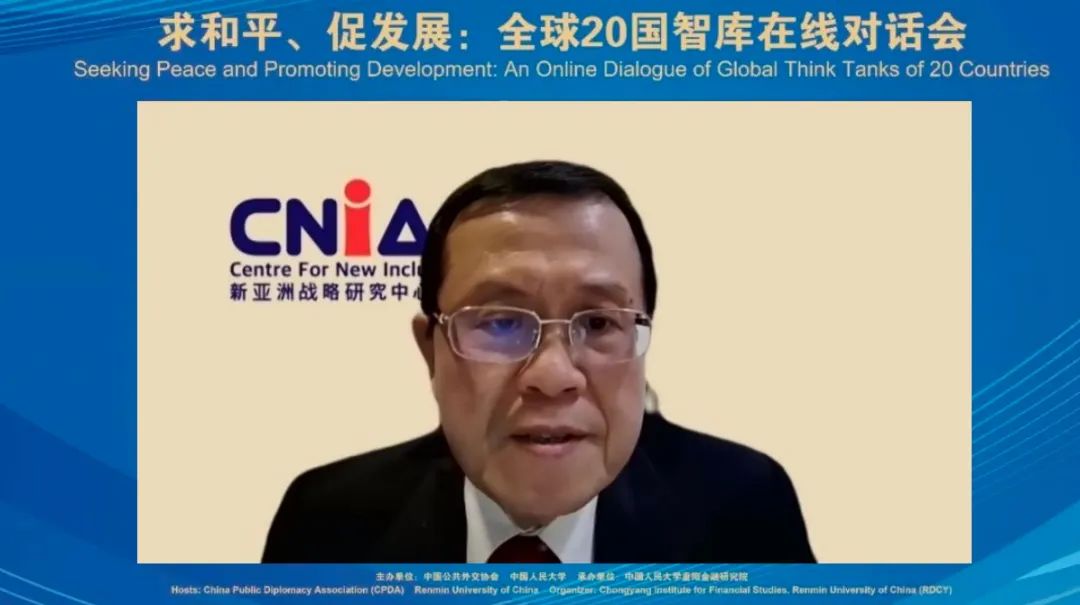发布时间:2022-05-09 作者: 翁诗杰
自古以来,人类在战争与和平之间就从未间歇折腾。如果没有军事强邻的合作,寻求和平对于脆弱的小国来说,无疑是一种单方面的一厢情愿。
自古以来,人类在战争与和平之间就从未间歇折腾。如果没有军事强邻的合作,寻求和平对于脆弱的小国来说,无疑是一种单方面的一厢情愿。
编者按:5月6日晚,中国公共外交协会、中国人民大学主办,中国人民大学重阳金融研究院承办召开“求和平、促发展:全球20国智库在线对话会”。外交部副部长乐玉成作特别演讲并现场问答。马来西亚国会下议院原副议长、新亚洲战略研究中心主席翁诗杰进行与会演讲,深入分析全球安全倡议相关问题。

自古以来,人类在战争与和平之间就从未间歇折腾。如果没有军事强邻的合作,寻求和平对于脆弱的小国来说,无疑是一种单方面的一厢情愿。近年来,随着冷战幽灵的复活,寻求地区或全球和平比以往任何时候都更具挑战性,因为当今世界已被地缘政治的分歧严重分割。
全球化曾给世界带来一个推动经济发展的多边合作时代,如今却屡受单边制裁和经济脱钩事件的冲击而倒退。打着民主口号的好战沙文主义提高了调门,掩饰自己志在颠覆他国政权的邪恶举动;一些国家被迫以牺牲本身独立的外交政策为代价,效忠于霸权。植根于《联合国宪章》的国际秩序一再被二战后制定规则的国家不加掩饰地篡夺扭曲,可国际社会却被迫服从于霸权主导下所谓“基于规则”的秩序。
尽管全球愈来愈多披着安全条约外衣的军事联盟相继崛起,以保世界霸主的安全,但随着国家之间的信任赤字鸿沟日益扩大,全球安全体系实际上已面对更大的凶险。 源源不断的武器流通日趋猖獗,丰润了美国军工联合体的收益金库。在这种黯淡的安全背景下,习近平主席提出的“全球安全倡议”无疑是及时的号角,对当前不断升级的地缘政治紧张局势,提供了替代的解决方案。
习主席于2014年在上海举行的“第四届亚洲相互协作与信任措施会议峰会”上首次提出这项“全球安全倡议”,呼吁建立相互尊重、开放融合的“共同、综合、合作、可持续”的安全观。它最初只是针对亚洲而言,可现在它对当前的世界局势愈发贴切。
“全球安全倡议”提出了“不可分割的安全”原则。 它禁止任何国家损人利己,以牺牲他国的安全为代价来加强自身的安全,这与1999年欧洲安全与合作组织成员国(包括美国和加拿大)在伊斯坦布尔签署的《欧洲安全宪章》相互呼应。
尽管如此,如果一个国家执意以单方面的狭隘利益为出发,任何单一的宪章都不可能对军事冲突起着阻遏作用。与此同时,如果要避免全面冲突,冲突各造所提出的合法安全关切是必需平等处理,同时必须严正看待各种关切的分歧。
必须承认的事实是,当前全球各地军事冲突引发的风险日增,但如果能够通过促进发展,特别是通过跨境发展,使其联通性促成彼此经济利益的交织,共享经济红利,这将有助于大大降低潜在军事冲突的风险。
在这种情况下,“全球安全倡议”不应被独立解读,更不应将其视为对当前任何安全协议的回应。事实上,这倡议与中国此前提出的“一带一路”、“人类命运共同体”与“全球发展倡议”等倡议是不能切割的。简言之,这是中国作为一个负责任的崛起大国,向国际社会提出的整体战略的一部分,旨让世界成为一个更安全、更具包容性和可持续发展的人类家园。
“全球安全倡议”本身就是一项契合时宜的公共产品,值得全球关注。在生存威胁日趋严重、军事冲突屡见频仍的情况下,任何以牺牲全球和平与团结为代价来维护本身地缘政治主导地位的霸权举动,都是短视且鄙夷的,理应受到世界各国的鄙弃。
以下为英文版
Since time immemorial, human beings have never ceased to grapple with war and peace. Seeking peace, to the small and vulnerable states, has always remained an intractable concern without the cooperation of their neighbours, notably those with military might. In recent years, with the resurrection of the Cold War spectre by the reigning hegemon , seeking regional or global peace has even been more challenging than ever before, as the world is now heavily compartmentalised, if not fragmented, along geopolitical rifts.
Globalisation which has once presented the world with an era of multilateral cooperation that propelled economic development is now backpedaling with increasing incidences of unilateral sanctions and economic decoupling. Jingoistic battle cries in the name of democracy have been revved up to camouflage the nefarious move in staging " regime change". And fealty to the reigning hegemon at the expense of pursuing independent foreign policies is commanded. International order rooted in the United Nations Charter has time and again been usurped unabashedly by the very nation which set the rules after WWII. Yet the international community is coerced to toe the " rules-based " order dictated by the hegemon.
While more military blocs cloaked in the outfit of security pacts were formed across the globe to make the hegemon feel safe, the more imperiled the global security is getting as the gulf of trust deficit between nation states widens. Unabated flow of arms dominates order of the day with coffers of the US military-industrial complex enriched to the brim. Given such a gloomy security backdrop, President Xi's " Global Security Initiative " is no doubt a timely clarion call that provides the world with an alternative solution to the escalating geopolitical tension.
Global Security Initiative ( GSI ) evolved from President Xi's proposal at the " 4th Summit of the Conference on Interaction and Confidence Building Measures in Asia " at Shanghai in 2014, calls for a "common, comprehensive, cooperative and sustainable" security model of mutual respect, openness and integration. It was first directed to Asia, but now it is increasingly relevant in the global perspective.
In the proposed Global Security Initiative, the principle of "indivisible security" is raised. It seeks to forbid any country from strengthening its own security at the expense of others, echoing a 1999 charter signed in Istanbul by members of the Organisation for Security and Cooperation in Europe, which includes the United States and Canada.
Be that as it may, in reality, no single charter could ever make an effective deterrent to military conflicts if only narrow unilateral gains of a nation were to be pursued. Parallel to this, legitimate security concerns of all conflicting nations involved have to be addressed even-handedly to synthesize differences, if full-blown conflicts were to be averted.
While acknowledging the global vulnerability to military conflicts in the prevailing scenario, it is not too far-fetched to envision that risks of potential military clashes could be minimized considerably if economic dividends could be reaped jointly through the promotion of development, notably through the connectivity of trans-border development where economic interests of neighbouring countries in the region are all set to intertwine.
In this context, the Global Security Initiative should not be read and interpreted independently. Much less should it be deemed a spontaneous response to any specific existing security pacts. It must be read in conjunction with such preceding proposals of China as the " Belt and Road Initiative", the ideal of " Building a community with shared future for humankind" and the " Global Development Initiative ". In short, it is part of the holistic strategy China offers to the international community in its bid as a responsible rising power to make the world a safer, a more inclusive and sustainable home for humankind.
This by itself is a timely and relevant public good that warrants global attention and common sense across the political spectrum worldwide. Amid the growing existential threats compounded with increasing vulnerability to military clashes, any hegemonic moves to maintain one's geopolitical primacy at the expense of global peace and solidarity is nothing but a myopic yet despicable move that deserves the global disdain.
(欢迎关注人大重阳新浪微博:@人大重阳 ;微信公众号:rdcy2013)